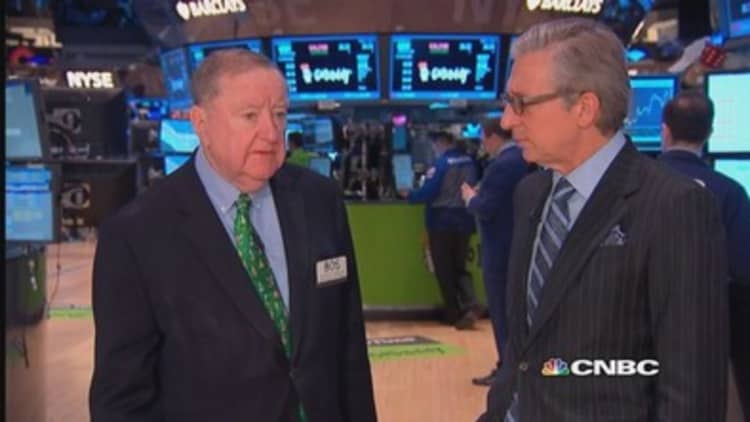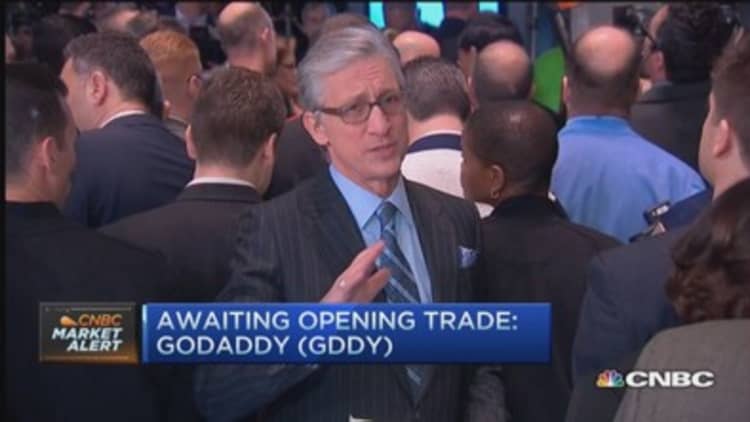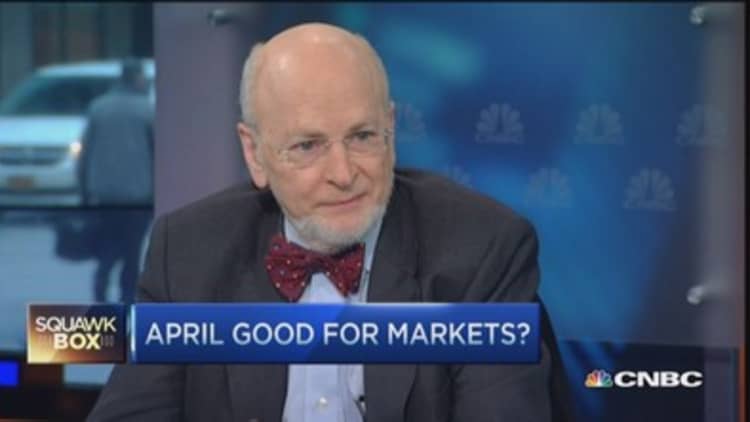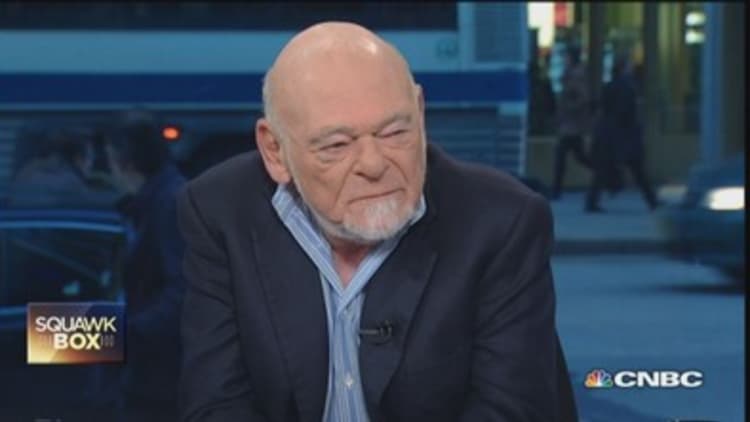



U.S. stocks closed lower on Wednesday as investors weighed softness in economic data ahead of Friday's important jobs report.
"The economic news for the last few months has been really tepid and trending downwards," said Adrian Day of Adrian Day Asset Management. "I think we're going to see weaker earnings in the coming period. When you add it all together the next earnings season is going to be quite weak and a potential knock to the market."
Stocks pared early morning losses but held moderate declines in the close. The Dow Jones industrial average fell as much as 191 points soon after the open before halving losses, with Wal-Mart leading decliners.
"The economic data was what pushed markets down to start with," said Paul Nolte, portfolio manager at Kingsview Asset Management. He noted that investors likely renewed buying after realizing weak reports would tend to keep the Federal Reserve from raising rates soon.
"At some point bad news will be bad news," he said, "but right now the day of reckoning will be pushed out."
"Based on (the Fed's) comments and data I don't think they'll be aggressively advancing that Fed funds rate," said Tim Dreiling, senior portfolio manager at U.S. Bank Wealth Management. "This has to be one of the most telegraphed Fed moves ever. They've spent an enormous amount of time prepping us for something. But again we're going to watch the data."
Read MoreWeak ADP sets up dovish bets for jobs report
The other major indices closed down about 0.40 percent. The Nasdaq composite dipped below its 50-day moving average of 4,866.25 in intraday trade as biotechs declined.
The iShares Nasdaq biotechnology ETF (IBB) closed down about 1 percent.
Art Hogan, chief market strategist at Wunderlich Securities, pointed out that the Nasdaq is the only major index significantly positive for the year, making it and its leading biotech sector a target for profit-taking in absence of news.
"We've got a week where we unfortunately need a significant catalyst to move us one way or the other," he said.
Higher oil prices and a Deutsche Bank downgrade pressured airline stocks, briefly sending the Dow transports more than 1 percent lower to below its 200-day moving average of 8,660.87. The energy sector gained about 0.20 percent as one of the few advancers in the S&P 500.
Read MoreWhat's behind the market's April Fools' selloff
"Most important is the weaker economic news that we got," said Peter Cardillo, chief market economist at Rockwell Global Capital. "Obviously supporting the fact that we're headed to a very poor or very ugly earnings season in the first quarter."
He also pointed to overall weakness in global economic data as weighing on U.S. profits. China's Purchasing Managers' Index (PMI) was still tepid despite rising to 50.1 in March from February's 49.9. The reading was a touch above the 50-mark that that separates growth from contraction.
"We can't sustain 3 to 3.5 percent without the help of Asia and Europe," Cardillo said.
Read MoreAfraid of stocks? Here's one place you can look
"It's hard to see how the U.S. is going to raise rates in the face of global weakness," Kingsview's Nolte said. "We only raise rates because we can and it could be a 'one and done.'"
Futures continued to point mildly lower after the morning's ADP employment report for March showed an increase of 189,000 in monthly private payrolls, below expectations of a modest rise to around 225,000.
"It was a little weaker than I would have liked to see and what we expected. Certainly sets up for Friday's number to disappoint," said Mark Luschini, chief investment strategist at Janney Montgomery Scott. "When you have full valuations the market demands good news."
The U.S. 10-year Treasury yield extended declines to trade as low as 1.85 percent. The U.S. dollar traded flat with the euro holding under $1.08.
The , the weakest level on this indicator since last May. Construction spending fell 0.1 percent in February, for a second straight month of decline.
Growth in the U.S. manufacturing sector rose to a five-month high in March as output and employment gained. Markit said its final U.S. Manufacturing Purchasing Managers' Index rose to 55.7 in March from 55.1 in February.
"The market is going to be in a trading range until Friday's number and we start earnings season," said Peter Boockvar, chief market analyst at The Lindsey Group. He noted that the last two days' swings have kept the S&P 500 within the 2,040 and 2,120 range.
"If we break below (the 2,035 or 2,040) level perhaps the decline we've seen over the last few days could worsen before we see employment data," Cardillo said.
DJIA 5-day performance
Friday's monthly employment report is expected to show another increase in nonfarm payrolls of around 250,000 in March. The unemployment rate is seen unchanged, at a more than six-and-a-half-year low of 5.5 percent.
In an encouraging sign that the housing market is picking up with the onset of spring, weekly mortgage application volume increased 4.6 percent on a seasonally adjusted basis, the Mortgage Bankers Association (MBA) said.
Auto sales showed a seasonally adjusted rate of 17.15 million in March, above expectations of an increase to 16.9 million from 16.2 million.
Ford reported a less-than-expected decline of 3.4 percent for March. Chrysler sales increased 1.7 percent, about one percent below expectations. General Motors reported a greater-than-expected decline of 2.4 percent. Toyota's U.S. sales beat estimates slightly, showing growth of 4.9 percent.
Investors are also preparing for a shorter week due to the Easter vacation as stock markets are also closed for Good Friday and bond markets close early.
GoDaddy closed at $26.15 a share in its first day of trade under the symbol "GDDY." The website hosting service announced late on Tuesday that its initial public offering will price at $20 per share, valuing the company about $4.5 billion.
European stocks closed higher on Wednesday as fresh economic reports continued to show growth in the euro zone.
U.S. stocks closed lower on Tuesday, giving back most of Monday's major gains, as investors eyed mixed economic data and the end of the first quarter.
Major U.S. Indexes
Oil futures extended gains following the weekly inventory report that showed an increase of 4.8 million barrels. Investors also eyed extended talks between Iran and six world powers. A last-minute deal over Iran's nuclear program could allow more Iranian crude oil into world markets.
U.S. crude oil futures settled up $2.49 at $50.09 a barrel on the New York Mercantile Exchange.
In continued remarks from central bank policymakers, Atlanta Federal Reserve bank president Dennis Lockhart said on Wednesday that the United States remains on track for a likely interest rate hike in the June to September period, with a weak first quarter likely to give way to stronger growth.
McDonald's announced in the afternoon that it is raising pay by more than 10 percent for about 90,000 workers at corporate-owned locations.
Delta Air Lines became the first U.S. airline to partner with Alibaba Group's affiliate Ant Financial to accept payment for flight tickets through Alipay.
Time Warner's Turner Broadcasting and HBO reached separate distribution agreements with Dish Networks, Time Warner told CNBC on Wednesday. HBO is expected to launch its on-demand video service through Apple within the next two weeks.
Amazon has unveiled a WiFi connected device called a "Dash Button," allowing consumers to order products from brands like Dash, Huggies, and Gillette merely by pressing the button. The offer is only open to Prime members who receive an email invitation.
Read MoreEarly movers: SHLD, WMT, GDDY, AAPL, DAL & more
Simon Property withdrew its buyout offer of $95.50 a share for Macerich after the rival mall operator's board decided not to hold discussions on the offer.
The CBOE Volatility Index (VIX), widely considered the best gauge of fear in the market, traded near 16.
The Dow Jones Industrial Average closed down 77.94 points, or 0.44 percent, at 17,698.18, with Wal-Mart the greatest laggard and Goldman Sachs leading gains.
The closed down 8.20 points, or 0.40 percent, at 2,059.69, with health care the greatest of five laggards and telecommunications leading advancers.
The Nasdaq closed down 20.66 points, or 0.42 percent, at 4,880.23.
Advancers were a step ahead of decliners on the New York Stock Exchange, with an exchange volume of 785 million and a composite volume of 3.5 billion in the close.
Gold futures settled up $25 at $1,208.20 an ounce.
—Reuters and CNBC's Peter Schacknow contributed to this report.
On tap this week:
Thursday
Earnings: CarMax, Micron
8:30 am: Initial claims
8:30 am: International trade
10:00 am: Factory orders
Friday
Good Friday holiday
Stock and bond markets closed
Futures markets open holiday schedule
8:30 am: Employment
8:30 am: Minneapolis Fed President Narayana welcoming remarks, community development conference
More From CNBC.com:


